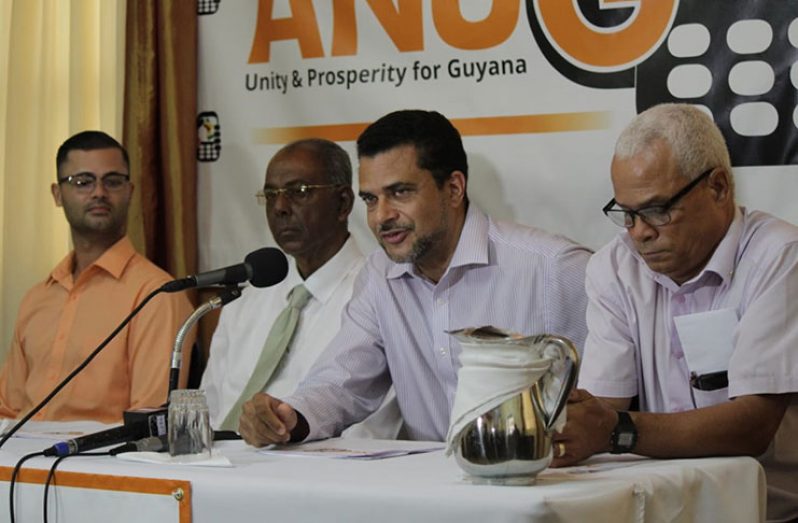…says gov’t needed to steer ship
…cannot just ‘close-up shop and walk out’
THE political party ‘A New and United Guyana’ (ANUG) is calling on the incumbent APNU+AFC government and the political opposition the PPP/C to engage in a system of “shared governance” until the next elections are held.
This point was articulated by ANUG Chair and Attorney, Timothy Jonas, at a press conference on Tuesday, one day after the Caribbean Court of Justice (CCJ) rulings.
According to the rulings, the No-Confidence motion (NCM) brought against the incumbent A Partnership for National Unity + Alliance for Change (APNU + AFC) government last December, was properly passed. President David Granger has since said that the government will accept and abide by this decision. CCJ President, Justice Adrian Saunders, in delivering the judgement, also urged the local political parties to discuss and decide on the consequential orders to be made as a result of the passage of the NCM, lest the court intervenes if a consensus is not arrived at.
“The CCJ said, optimistically and probably naively, that the two major political parties [the APNU+ AFC and the People’s Progressive Party/ Civic (PPP/C)] need to have a discussion in the interest of the country on the way forward,” Jonas said.
He, however, went on to opine that following the CCJ’s judgement, there has been no indication that this discussion will be had. Instead, according to him, there has been a “triumph roar” from one major political party and “stubborn determination” from the country’s other major political bloc. This, the chairman further said, is counterproductive to advancing the interests of the country. In fact, Jonas highlighted that “the interest” of the country requires the coalition government and the PPP to cooperate.
COOPERATION NEEDED
While he said ANUG believes the government and Opposition should meet and discuss the timelines for holding elections, in the context of the NCM, the parties should also adopt a system to share governance until those elections are held. “This is the time, in the interest of the nation, for the two sides to agree on a methodology, moving forward until elections, for there to be an inclusive governance for both sides to have a say in how the country is run until the next election cycle,” he said.
And he said the newly-formed party is calling on the two sides to use this time to implement the system so that there is a “testing ground” for meaningful constitutional reform to be had in advancing the cause of inclusive governance.
In a statement, ANUG noted that ethno-politics has long since plagued Guyana’s political arena. And though third parties emerged in an attempt to offer another option to the ethno-politics, ANUG noted that it has been seen that citizens are “… unwilling to abandon what they believe to be the safety and comfort of their traditional ethnic party”.
This shared governance model, however, allows for some leeway in moving past that occurrence, the statement noted. “ANUG’s offer is not to challenge or defy the ethno-political will of the people of Guyana but to create a system where both major parties share in the government,” the party said in its statement.
He added: “We are offering the people of Guyana to make their political parties winners, whatever the outcome of the elections.”
Jonas was also asked whether the current government should demit office given that the three-month period before elections must be held following the passage of the NCM ended in March. He related that an arbitrary decision cannot be made for the government to just “close-up shop, lock the doors and walk out” since the country still needs to operate.
STAY OF NECESSITY
“We are in a stay of necessity,” Jones said, explaining that the “bare bones” of government’s operations, such as allowing people to continue working and being paid must go on. However, he posited that larger policy decisions, including the provisions contracts or instituting legislative changes, should not be made during this time. “The government doesn’t just close the doors, the country must go on and the arms of the State that provide us the services must continue but what is important is a consensual approach moving forward to a fair election,” Jonas elaborated.
As the country moves towards elections, however, he stressed continuously that Guyana is presented with a unique opportunity to introduce temporary measures to “experiment” with a shared governance model. This model, the attorney opined, will “harmoniously” guide the country to the next elections, in a manner that inspires confidence of the electorate, instead of a manner that causes distrust.




.png)









